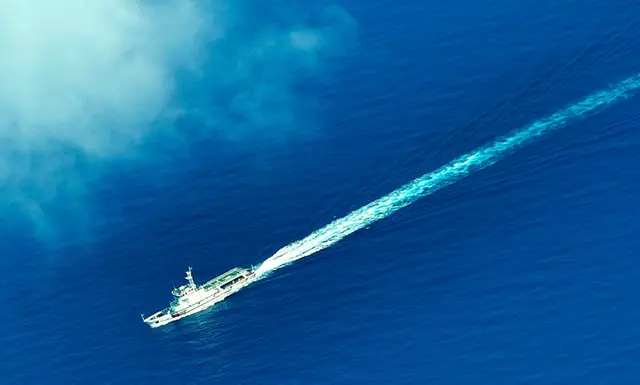Although there are no problems with free navigation in the South China Sea, certain countries still insist on repeated testing of the waters.
It's OK if they are willing to do so, but it could be done in a more graceful and less costly way.
For thousands of years, except during the atrocious invasion by Japanese troops, the South China Sea has been a peaceful sea passage. Countries in this area have all co-existed peacefully and in harmony,a situation much desired by those under duress in hot spots throughout the world.
Cases of friction among the countries in the region are rare and they have developed their own way to address them.
As all people know, there are over 100,000 ships from countries around the world sailing safely and freely through the South China Sea every year. They don't run into any problems.
Moreover,countries in this area, including China, have openly stated that they respect and safeguard the freedom of navigation and flight in the South China Sea that all countries enjoy under international law.
If there isn't the slightest threat to freedom of navigation on the South China Sea, then why are warships insistent on sailing halfway around the globe to stir peaceful waters?
Travelling such a distance must come at a high cost, considering the consumption of fuel and the need to provide supplies for all staff on board.
Even if a perfect record for safe passages and pledges from other countries are not enough evidence of the freedom of navigation in the South China Sea, there are more graceful and less costly ways to test.
Why not sail the South China Sea in the same way thousands of civilian vessels do each year to get a genuine perspective? There is no need to disturb the normal passage of civilian ships and normal operation of facilities serving the public interests.
The psychological stress created on passing ships and people in this region from fabricated military threats and warships looming close to civil facilities is needless.
Make people believe you are here to test free navigation, not to show force or intimidate peace-loving people in this region.
If tests of navigation must be made, avoid doing it frequently. To cut cost, at least.
People in this region have long cherished the glorious American contributions in World War II, for the fight against the hideous Japanese aggressors during World War II.
That brilliant image, a valuable asset to the U.S.rise and prosperity, will long stay in the hearts of people here as long as it continues to actively contribute to regional peace and stability.
 简体中文
简体中文






